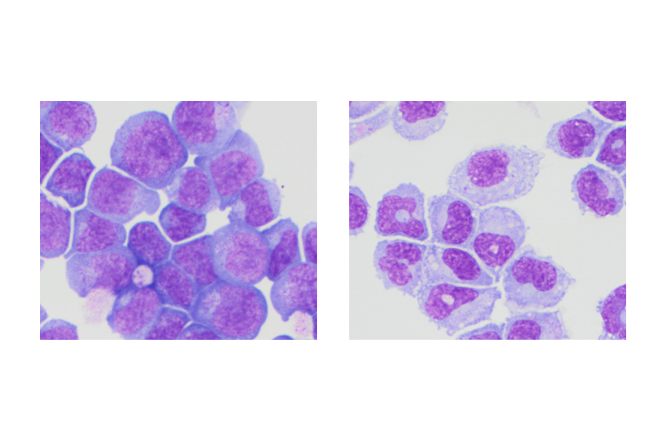31/01/2019
Print PagePsychiatric drug as a new treatment for leukemia
Acute myeloid leukemia (AML) is a disease that primarily affects older patients. Despite improved therapies, resistance in this type of leukemia is still an urgent problem, so there is a pressing need for new drugs. Those affected by AML experience an increase in the number of immature cells in their bone marrow that are unable to mature into normal blood cells.
One of the cancer researchers’ key aims is therefore to make leukemia cells mature again so as to cure the disease. There are also epigenetic factors involved in the maturation process of blood cells, including an enzyme called lysine-specific demethylase 1 (LSD1). LSD1 influences the DNA packaging and alters the way important genes are expressed. Scientists have known for some years that LSD1 inhibitors can cause leukemia cells to mature, especially if the treatment is combined with ATRA, a derivative of vitamin A. This therapy only works in certain types of AML, however, and for a long time it was not clear why.
In their research, which was funded by the German Cancer Consortium (DKTK) and the German Research Foundation (DFG), Tobias Berg’s team at the Department of Medicine II (Hematology/Oncology) at University Hospital Frankfurt, led by DKTK site spokesman Hubert Serve, have succeeded in uncovering how LSD1 inhibitors work. Numerous colleagues from the groups led by Michael Lübbert, Roland Schüle and Manfred Jung at the DKTK site in Freiburg, and Cyrus Khandanpour in Münster were also involved in the project.
The team demonstrated that blocking the LSD1 regulator with drugs boosts the activity of certain gene-regulating factors that are important for cell maturation. As a result of the treatment, leukemia cells from mice matured to cells similar to normal blood cells. In addition, the research team discovered that only certain LSD1 inhibitors have this effect: The most effective result was observed with chemical derivatives of tranylcypromine (TCP). TCP itself is already licensed for the treatment of depression and it also blocks LSD1.
The TRANSATRA trial, part of the DKTK’s multi-center LACID initiative (LSD1 as anticancer target in the clinic and in drug discovery), is investigating whether the drug is also effective and well tolerated in AML patients. “The new findings from our recent research are very valuable for drug development and will now be used in the TRANSATRA clinical trial,” says Tobias Berg. “In the future, we hope to be able to predict which patients will respond to treatment.” The TRANSATRA trial involves combining the LSD1 inhibitor tranylcypromine (TCP) with ATRA and a low dose of chemotherapy. The TRANSATRA trial (EudraCT No.: 2014-001479-30) is also being coordinated through the DKTK – by the Internal Medicine Clinic I at University Hospital Freiburg (project leader Michael Lübbert). It is being conducted in Freiburg and Frankfurt and at four other top oncological centers in Germany. Phase I is now complete and the trial is looking for more participants to test the effectiveness of the drug in humans.
Original publication:
Barth J, Abou-El-Ardat K, Dalic D, Kurrle N, Maier AM, Mohr S, Schütte J, Vassen L, Greve G, Schulz-Fincke J, Schmitt M, Tosic M, Metzger E, Bug G, Khandanpour C, Wagner SA, Lübbert M, Jung M, Serve H, Schüle R & Berg T. LSD1 inhibition by tranylcypromine derivatives interferes with GFI1-mediated repression of PU.1 target genes and induces differentiation in AML. Leukemia, in press.
